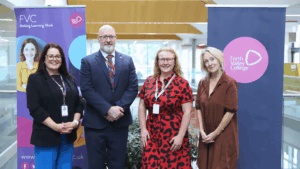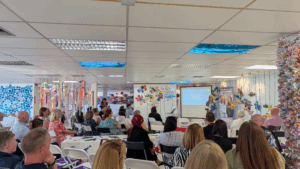
Funding cuts to programmes with proven results highlights short-sighted councils scrambling to save cash.
It doesn’t take a village to raise a child. Hillary Clinton’s publishers pounced on this folksy Nigerian proverb for the title of her bumper-sticker philosophy book on childrearing, but that doesn’t make it true.
According to a friend with more than 35 years of experience as an NHS psychiatrist, it takes only one person to rescue a child from a lifetime of trouble.
It’s better if an entire loving family supports every infant, but even in the most chaotic of households the worst traumas can be averted by a caring grannie, a devoted sibling, or a teacher going the extra mile.
They don’t need to be a saint or a hero. Often people who were inadequate parents turn out to be supportive grandparents. This truism is a testimony to the resilience of kids. Generation snowflake is a construct of bitter older people. Humans are tougher than we imagine.
Iain MacRitchie, a Glaswegian entrepreneur and company turnaround specialist, has harnessed this knowledge to impressive success. Brought in as an adviser to salvage three failing care companies that ran 90 children’s homes, five schools and a foster agency, he succeeded in rescuing the organisations financially only to discover that it made no difference to the outcomes of the young people in their care.
The opposite was true. The better the facilities became and the better motivated the staff, the worse the outcomes for their residents. As soon as a young person’s behaviour stabilised and they re-engaged with education or society, the system moved them out and they regressed.
MacRitchie became obsessed with solving this problem. In 2007 he launched MCR Pathways, a volunteer mentoring scheme that matches senior public figures and business people in Scotland with disadvantaged pupils in their final three years of secondary school.
The mentor’s job is to listen and, most importantly, to care. No other skill is required. They meet their mentee in school for a minimum of one hour every week during the school year. Together, they explore the student’s talents and interests to find opportunities to fulfil their potential.
The beauty of the model is its simplicity. It is care in its purest form. The results have been little short of sensational. The programme, which started in Glasgow, now supports 15,000 young people across Scotland and the UK. Nearly 90 per cent go on to college, university or a job, compared with only 50 per cent of children in care who have not been mentored.
MacRitchie has analysed what doesn’t work to pinpoint what does. The programme is delivered in schools because education is the only thing that consistently makes a difference to young people’s life opportunities, he says.
Now, though, local authority cuts mean that MCR Pathways is under threat. Teacher time is not affected by the programme. Every school involved has a co-ordinator, a member of staff who identifies the pupils as they arrive at secondary school and helps to match them with the right mentor. The co-ordinators serve as a constant link between the young people, their mentors and the school.
This month Glasgow city council voted to cut support for the scheme. The co-ordinators were called to a meeting and told their roles would end in August. The council is framing the change as a review of the programme, but budget documents have already pencilled in the savings from cutting the positions.
MacRitchie is adamant that running the programme without the co-ordinators will not work. A petition has been started. “What we are doing really matters,” he says. “Nothing is worth doing if you cannot sustain the change.”
MCR Pathways is a beacon in an often dysfunctional children’s social care sector that cost the taxpayer £680 million in 2021. But all over Scotland, organisations exist that do impactful work in local communities.
Often the simplest solutions make the biggest difference. Sports groups, youth theatres, libraries, language classes, breakfast clubs, food banks, choirs, mental health groups, relatives’ groups, swap shops — many of us will never use them, but we all benefit from their presence. They underpin civil society.
The best of them intervene before a situation becomes a crisis. They rely on the goodwill of volunteers and scraps of funding from wherever they can get it. They save millions of pounds further down the line.
With the scale of the cutbacks hitting local government, many of these organisations will be axed without consultation. Once dismantled, they are difficult to rebuild. Goodwill dissolves faster than aspirin.
When they go, the impact will not be felt immediately. It will be a gradual hollowing out of civic society. We’ll notice it in the increased number of used needles in the playpark and the rise in rough sleepers in the doorways of boarded-up shops. We need to act and find our voices now. These are our communities. We are the only ones who can save them.
The priorities of politicians are not and have never been the priorities of the communities they serve. Politicians may have many noble objectives, but their overarching mission is re-election. That means that inevitably perception trumps reality. Optics matter more than substance.
We’re at a pivotal point. Organisations such as MCR Pathways can still be saved. But the trajectory of the SNP government, which has presided over the present situation, still has some way to run.
The next Scottish election is not until May 7, 2026. The strength of the SNP’s majority means it is not inconceivable that even if its vote is decimated, it could limp on in power until 2030. By then the outlook for our children and our villages will be considerably bleaker.





